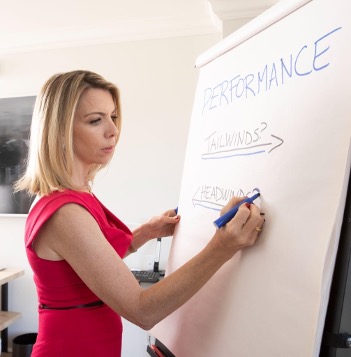Interview with Christina Curtis: Building a Culture that Fosters High-Performance
“The skills required to lead high-performance teams have shifted more in the last two years than they did in the previous two decades,” explains Christina Curtis, Senior Advisor of Talent Strategy at Blackhorn Ventures. “The pandemic was an awakening, further blurring the division between our personal and professional lives. All of us had to step back and ask, “What do I want out of my life, and how does work fit into that?”
Christina has worked with hundreds of high-performing teams at companies like Google, Microsoft, KPMG, DaVita, Lockheed Martin Space, and Overstock.com. She joined Blackhorn Ventures earlier this year, providing her expertise as one of America’s most respected and sought-after executive coaches. A thought leader on motivation and goal attainment, she currently writes for Harvard Business Review, Forbes, Talent Management Magazine, and Psychology Today.
You’ve worked with a number of private equity and venture firms over your career, what brought you to this role, and why now?
I was a Blackhorn investor before I became an Advisor, so when asked to come onboard, the decision was easy. I had already seen the team in action, and had never met a group of individuals so driven by a purpose that extends far beyond their company walls. You can’t help but be inspired by the experience and talent of the leadership team and their visionary portfolio companies. The mission has had a gravitational pull in terms of bringing together a unique group of industry leaders. At this point in my career, where the time and impact ratio matters more to me than ever, there’s no place I’d rather be.

What’s your perspective on ‘the Great Resignation’? How should startup CEOs be thinking about retaining team members, and onboarding high-impact talent?
People don’t want to feel like an easily replaceable cog in someone else’s wheel. In fact, the reverse is more true today: Companies are now cogs in the wheels of their employees’ lives. The recipe for attracting high performing talent is clearer now than ever: unified goals; high standards for performance; transparency; recognition and reward; optimism, and a strong sense of believing.
You’ve written in Harvard Business Review about the importance of making sure team members feel valued, seen and heard; why are these concepts so critical for organizational success?
The word “Heliotropic” comes to mind. Plants rotate towards the sun to enhance the photosynthesis process, right? Well people are heliotropic in that we seek out those who make us feel valued, seen, and heard. That feeling enables us to perform at our best. The challenge is that leaders get distracted by the never-ending barrage of tasks – “tyranny of the urgent” – and can lose focus on the activities required to create the conditions for high performance.
It doesn’t matter how smart an entrepreneur may be, or how hard working they are, if they can’t harness the power of the collective, they are a leader without leverage. I find it useful to reflect everyday on how you want people to feel when you engage, and to hold onto that intent so that every interaction is positioned to be a powerful one. Every moment is an opportunity to generate momentum and energy that goes on long after you have left the room.

For entrepreneurs looking to build and sustain a culture of excellence in high performance, what are the three most important things they can do right now?
First, take care of yourself. On airplanes, we are told to put our own oxygen mask on before we do the same for anyone with whom we are traveling. When we don’t take care of ourselves, we can’t take care of others.
Yet most of us say yes to too many things, leaving us with packed days that are overflowing with obligation. We end up with a dysfunctional relationship with time. This leads to the loss of critical thinking power, our greatest asset, as our brain shifts from goal-directed behavior to self-preservation. We can become quietly resentful, reactive, feel overburdened, and lose our sense of resilience and patience with setbacks. I teach my clients to use their calendars to look at the past, present, and future simultaneously, so they can ask “is this conducive to me showing up at my best?”
Second, invest heavily in top talent. We need to invest in and develop those who could one day take over our roles – and let go of poor performers quickly! “Stay interviews” are a great way to check in on how others are doing by asking questions about what makes a company a great place to work, and what is detracting from their fulfillment or performance.
Three, listen. All too often, I see leaders perplexed when a team member quits. In reality, that team member had probably been talking about his or her concerns for some time. Leadership just wasn’t listening. It is the greatest tool every leader possesses because it provides access to more data for decision making. I don’t mean listening with a “yeah, but” attitude. I’m talking about a desire to understand. The three most important words a leader can say are, “Tell me more”.

What are you most excited to accomplish, and what are you most excited to learn in this new role?
Every entrepreneur knows the challenges that come when you are building a plane while you are flying it. I look forward to supporting Blackhorn and the portfolio company founders who are waking up every day wanting to grow their business and overachieve. It all begins with the leaders. Research shows that everything flows from the top, including a team’s results, morale, financial performance, and engagement. I’m honored to have the opportunity to connect with and serve entrepreneurs who are deeply committed to bringing their vision to life. Nothing could be more exciting to be a part of!